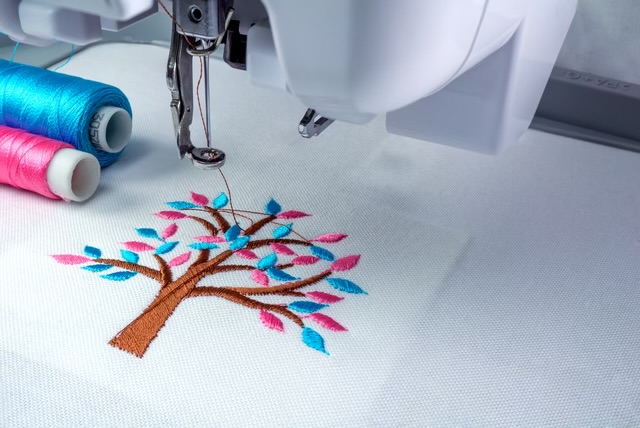Today’s consumers increasingly demand a greater degree of personalization in everything they purchase, from the clothes they wear to the decor they use in their homes. According to an article in Forbes, 83 percent of consumers not only want products to be personalized for them quickly and efficiently but have also come to expect it. As a result, the demand for custom apparel has never been higher.
“Even in the wake of the global pandemic, fashion remains one of the biggest industries in the world, valued at $1.7 trillion,” says Henry Ma, CEO of Ricoma, the world’s leading manufacturer of embroidery machines and other custom-apparel equipment. “As e-commerce and technological improvements continue to make on-demand garment personalization more accessible, the demand for individualized apparel will only grow.”
Understanding the options
According to Ma, the key to investing in the right machine is for aspiring apparel makers to understand their goals. “Do you want to make a living with this business? Or will it be a hobby?” he asks. “Be honest with yourself about the amount of time you intend to dedicate toward your apparel business. Someone who wants to do this full time should consider a larger, commercial machine, while someone who wants to approach it as a hobby should get a smaller, entry-level machine that costs less.”
Ma then recommends considering what kinds of merchandise you would like to offer since that could also direct you to certain machines and not others. “For example, if you want to make jackets or other bulky items, it would be good to get a machine with a large clearance area — such as our Marquee series — that can easily handle those garments,” he says.
Ma splits the offerings into three general categories: semi-commercial entry-level single-head machines, commercial single-head machines, and commercial multi-head machines.
“Semi-commercial entry-level single-head machines are a huge step up from single-needle embroidery machines and are ideal for hobbyists and people who want to customize apparel part-time,” he says. “Having a multi-needle, semi-commercial embroidery machine saves you from having to change your thread constantly since it has multiple needles that can take different colors. They are also compact and portable, making them a great choice for people who want to take a machine to trade shows or conventions.”
Commercial single-head machines are professional-grade machines appropriate for entrepreneurial-minded individuals and are designed to stand up to heavy, continuous use. “They have a larger embroidery area than semi-commercial machines and permit more complex designs,” Ma explains, “and operate much faster.”
Commercial multi-head machines can do multiple projects at the same time, making them appropriate for embroidery businesses that need to do bulk orders or are looking to scale up. “In my experience, people tend to invest in these machines either when they already have sufficient demand or anticipate future growth,” Ma explains. “It’s important to avoid underestimating the amount of business that’s going to come in when you enter this field. Otherwise, you can end up buying a new machine only a few months after you bought your first.”
Each of Ricoma’s commercial and semi-commercial embroidery machines comes with a wide range of accessories that enable users to embroider flat surfaces like t-shirts as well as baseball caps and other hats. They handle both DSB and DST design formats and have large memories capable of storing up to 1,000 designs or 100 million stitches.
Design and decorate your own brand
For many people, getting the opportunity to be creative and design their own garments is part of the appeal of starting their own custom apparel business. Ricoma’s digitizing software makes this process easy and intuitive.
Ricoma offers three different levels of digitizing software: Chroma Inspire, Chroma Plus, and Chroma Luxe. Each offers an accessible interface that turns ideas into embroidery designs quickly even for beginners.
“You don’t need to have a background in graphic design to be a digitizer,” says Ma. “With time, patience, and practice, anyone can transform their ideas into stunning embroidered designs. This will not only allow for greater earning potential and flexibility when embroidering, but it will also help entrepreneurs to differentiate themselves from other embroiderers who don’t provide this valuable service.”
Equipment plus education equals success
Ricoma prides itself on being a leading producer of engaging educational content to help aspiring decorators master their craft.
“One of our bedrock principles is that the only way we succeed is when our customers succeed,” Ma says. “That’s why we go above and beyond to provide everyone who trusts Ricoma with the resources and assistance they need to thrive in the marketplace.”
In addition to writing informative articles on a wide range of topics pertaining to the custom apparel industry, Ricoma also offers a vast library of free video tutorials across their various YouTube channels: Ricoma TV, Ricoma Prints, and Ricoma Crafts. If that wasn’t already enough, Ricoma also hosts free webinars and provides free downloads and cheat sheets to help new decorators reduce the learning curve and master their craft.
Create your company with a click
If you’ve always dreamed of starting your own business, then now’s the time to consider the wide range of benefits that would come from custom apparel. With Ricoma’s support, nothing is preventing you from unleashing your creativity and making your mark in this exciting market.




